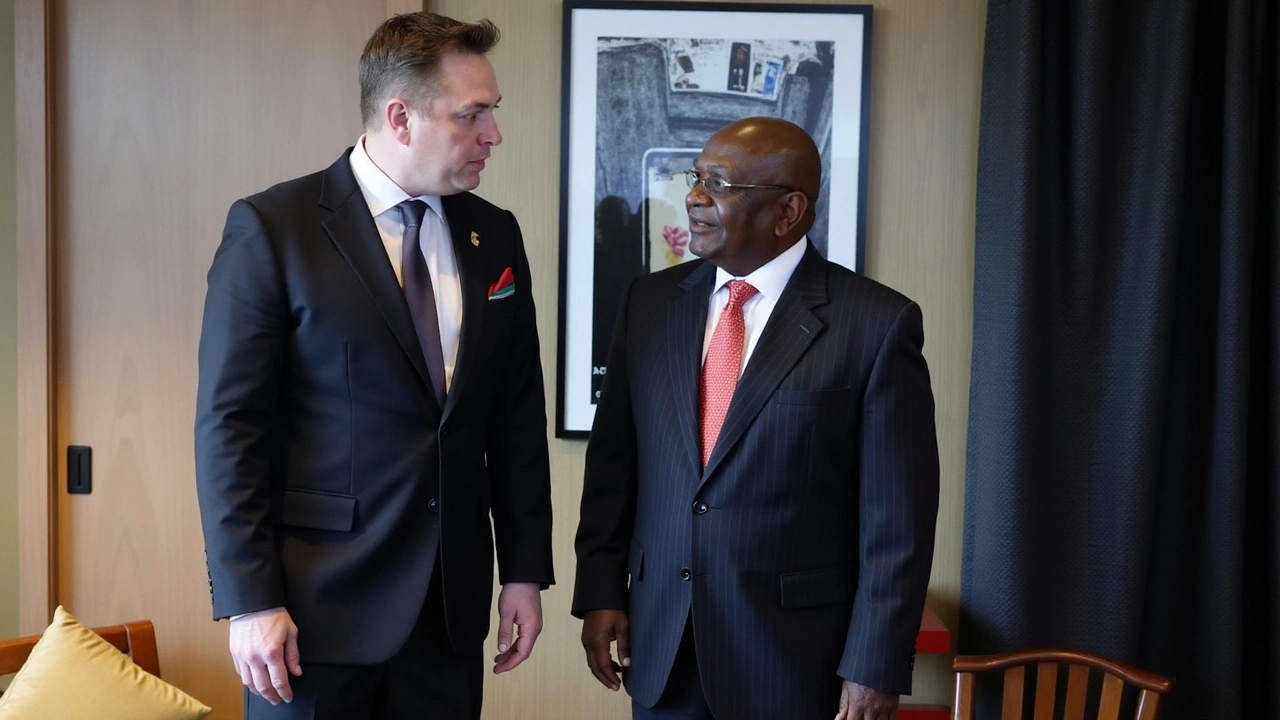Elon Musk's 'Great Meeting' with Cyril Ramaphosa Sparks Investment Talks
South African-born billionaire Elon Musk recently met with President Cyril Ramaphosa on the sidelines of the 78th United Nations General Assembly in New York. The meeting has caused a stir, with Musk describing it as 'great' and indicating his eagerness to assist South Africa in any way he can. This has naturally sparked discussions and curiosity about potential future collaborations and investments that could emerge from this high-profile encounter.
Musk, the CEO of both SpaceX and Tesla, was born in Pretoria and left South Africa for Canada with his family at the age of 17. Vincent Magwenya, Ramaphosa's spokesperson, confirmed that the meeting took place, adding an air of intrigue by not revealing the specifics of their discussion. This has left the public speculating about the possible ventures that could be explored between Musk's companies and the South African government.
Ramaphosa has been actively seeking to attract investments into South Africa, seeing it as a critical element for the country's economic growth. Throughout his trip to the United States, he has engaged with numerous business leaders and CEOs to promote South Africa as a viable destination for foreign investments. The high-profile meeting with Musk is seen as a significant step in this ongoing effort.
SpaceX and Tesla's Growing Africa Footprint
SpaceX has been making headlines with its innovative rocket and satellite technologies, most notably through its Starlink satellite internet service. Starlink aims to provide high-speed internet access to remote and underserved areas worldwide, and it has already started making inroads in several African countries. This aligns with Ramaphosa's vision of improving technological infrastructure and connectivity in South Africa, and a partnership with SpaceX could fast-track these goals.
Tesla, Musk's electric vehicle and clean energy company, has also expanded its presence in South Africa. The company has established several charging stations and service centers across the country, making it easier for South Africans to adopt electric vehicles. This expansion supports the global push towards greener alternatives and demonstrates Tesla's commitment to tapping into the African market.
Potential Areas of Collaboration
The details of Musk and Ramaphosa's conversation remain under wraps, but there are several potential areas where their interests could align. The South African government has been focusing on improving the country's energy sector, and Tesla's renewable energy solutions could be a game-changer. Additionally, with SpaceX's advanced satellite technologies, South Africa could significantly enhance its telecommunications and internet infrastructure.
Moreover, these potential collaborations come at a time when Africa is experiencing a tech boom, with increasing investment and interest in technology-driven solutions. Musk's innovative companies, known for pushing the boundaries in their respective fields, could play an instrumental role in this transformation. The African continent presents vast opportunities for technological advancements, and a synergy between Musk's ventures and South Africa could set a precedent for future collaborations.
Economic Implications
Any potential partnership or investment between Musk’s companies and South Africa would likely have significant economic implications. Enhanced technological infrastructure could attract further international business interest to the country. In turn, this would create jobs, spur local industries, and contribute to overall economic growth.
Additionally, the introduction of renewable energy solutions by Tesla could help South Africa address its ongoing power challenges. Energy stability is crucial for sustained economic development, and Tesla's innovations in solar energy and battery storage systems could provide much-needed solutions.
Looking Ahead
The meeting between Musk and Ramaphosa offers a promising glimpse into possible future collaborations that could bolster South Africa's economic and technological landscape. For now, the exact outcomes of their discussion remain speculative. However, the potential for significant developments in the near future seems likely. As both parties look to navigate the opportunities ahead, observers worldwide will be watching closely to see how this relationship unfolds.
In conclusion, the high-profile dialogue between South Africa's President and one of the world's most influential entrepreneurs underscores the importance of international partnerships in driving technological and economic progress. As we await further details, one thing is certain: this meeting has set the stage for what could be transformative changes in South Africa's journey towards greater innovation and growth.







James Lawyer
Elon Musk's South African heritage offers a rare diplomatic lever that could facilitate bilateral projects, especially in high‑tech infrastructure. His public endorsement of South Africa may encourage other foreign investors to reassess the country's risk profile. The potential partnership with SpaceX could accelerate broadband penetration via Starlink, addressing long‑standing connectivity gaps. Meanwhile, Tesla's renewable‑energy initiatives align with the government's drive to diversify the energy mix beyond coal. If these collaborations materialise, they could generate substantial employment and stimulate ancillary industries.
Abby Culbertson
this is so cool i cant wait for it
Awolumate Muhammed Abayomi
Yo, this is a big win for SA! Musk bringin SpaceX an Tesla can boost jobs-tha’s lit!!
Starlink could finally give rural villages decent internet, an' Tesla's solar can cut those blackouts. He was born here, so maybe he'll give us a sweet deal. Let's hope the govt can handle the paperwork fast.
Josh Tate
I feel optimistic about the tech boost, but we also need to watch the regulatory side. If policies stay stable, investors will feel safer.
At the same time, we shouldn't ignore the need for local talent development alongside these foreign projects.
John Smith
Let's cut the hype and look at the numbers: Musk's companies thrive where there's policy certainty and grid reliability. South Africa still battles inconsistent power supply, which could hamper Tesla's battery deployment. SpaceX's satellite service also requires clear spectrum allocation. If the government can lock down those regulatory fundamentals, then a partnership makes sense; otherwise, it risks being all show and no substance.
Alex Soete
Exactly! This could be a game‑changer for the continent.
Imagine every remote school getting reliable internet via Starlink while solar panels power the classrooms.
And the jobs created by local assembly lines for EVs would boost the economy in a real, tangible way.
Cara McKinzie
Well, here we go again, another billionaire swooping in with promises of miracles.
We'll see if any real change happens or if it's just another PR stunt.
Joseph Conlon
It’s tempting to get swept up in the spectacle of a high‑profile meeting, but we must remain vigilant about the underlying complexities. While Musk’s enthusiasm is palpable, the implementation of large‑scale infrastructure in South Africa faces entrenched logistical bottlenecks. The nation's regulatory environment has historically been slow to adapt to rapid technological change, which could stall any purported agreements. Additionally, the reliance on foreign capital raises questions about sovereignty and long‑term economic independence. Even if Starlink expands, the cost structure for end‑users in low‑income areas remains uncertain. Tesla’s battery technology, though groundbreaking, requires a stable grid to be truly effective-something the country continues to grapple with. Moreover, the prospect of creating jobs must be weighed against the potential displacement of existing industries. Local manufacturers may struggle to compete with imported components, leading to a net loss in domestic production capacity. The excitement surrounding a “great meeting” can easily obscure these nuanced trade‑offs. Therefore, any optimism should be tempered with a rigorous assessment of policy, financing, and capacity‑building frameworks. Only then can we determine whether this encounter will translate into substantive, equitable progress or remain a fleeting headline.